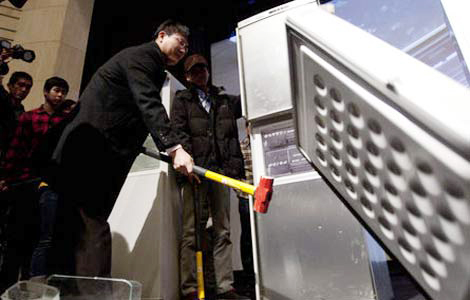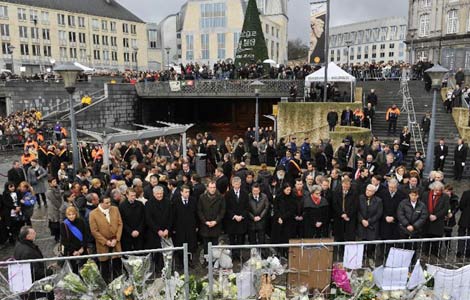First Christmas in China
Updated: 2011-12-21 15:58
By Brian Salter (chinadaily.com.cn)
|
|||||||||||
To be perfectly honest, I had all but forgotten that Christmas was on its way. Despite what the glitzy expatriate web sites are saying, I don't see Christmas trees and decorations everywhere (not living in the vicinity of Beijing's Diplomatic area, which of course is the exception). And having lived for the past decade in the Middle East (the majority in Saudi Arabia where anything remotely resembling Christmas is banned by the religious authorities) I can't say that it is something that I particularly miss.
So I was drawn up short the other day when I walked into a supermarket to the sound of Jingle Bells – that age old Christmas carol sung in Chinese. It was wonderful for me to hear a brand new take on a very old song.
The very next day I walked into the office and there in the entrance hall were four Chinese guys struggling to erect a not-very-big plastic Christmas tree, complete with flashing lights, tinsel and baubles. Given that Christmas is not a public holiday in China, I am assuming that in part it was a friendly gesture to the expatriates working here.
And yet, there is no mistaking the fact that the Chinese are usually pretty quick to spot a commercial opportunity a mile off. Official estimates state that less than five percent of China's 1.3 billion population is Christian, and Christmas is certainly not a religious holiday observed by many Chinese. It appears, however, that it is fast becoming a phenomenally popular commercial holiday. Among China's younger generation, Christmas has become more and more popular and, I am told, it is celebrated more like another Valentine's Day (yet another holiday that is banned by law in Saudi Arabia!).
In some of the touristy areas of Beijing pretty young girls sporting red Santa hats now try to tempt passers by into their shops; and sometimes the sight of a chubby old man with a red hat and thick white beard is becoming as common as Colonel Sanders, the other bearded man, who as the face of KFC has mushroomed all over China.
In the areas most visited by Westerners, such as the bars in Sanlitun or the shops and residences around Liangmaqiao, there are Christmas trees everywhere; but travel a few stations along the subway and it's like you have stepped out into a different time zone. Not a bauble in sight. Christmas has suddenly disappeared. Mind you, I haven't yet seen any mistletoe for sale anywhere in Beijing (a woody stemmed parasitic plant with waxy white berries) – something that you will always find in Europe. According to ancient Christmas custom, a man and a woman who meet under a hanging of mistletoe were obliged to kiss and even now, no girl can refuse to be kissed under the mistletoe!
On the one hand it's a little bizarre to be surrounded by so many of the accoutrements of Christmas without any of the religious beliefs associated with it, but I guess this is true in many parts of Asia.
Not that it is very different in parts of Europe now either. In the UK, some stores start gearing up for Christmas as early as October – something I particularly loathe – and there is no escaping the rampant commercialism for weeks on end. Most businessmen know that very little will get accomplished in the second half of December and many businesses shut down for a good two weeks holiday to include the new calendar year as well.
Again, in China the shops appear to combine the sale of gifts and decorations into a delightful mix of Christmas and Chinese New Year with some of the markets unashamedly mixing the decorations together to read "Holiday Greetings" or something similar.
Another mix of East and West is the abundance of "Glühwein" that has started to appear now that winter is well and truly upon us, with night time temperatures already hitting minus 10. This German tradition of heating red wine with cinnamon sticks, vanilla pods, cloves, citrus and sugar is a sure-fire way to beat Beijing’s winter cold. Many German cities have Glühwein stalls situated on practically every street corner, but there is little risk of a town full of drunks wandering the streets as the heat evaporates off the majority of the alcohol content in the wine. I have to admit to not being particularly turned on by Chinese red wine, but used as a basis for Glühwein, I am more than happy to change my opinion!
So "out of practice" as I most certainly am with Christmas festivities, it will make a pleasant change, I think, to experience a Chinese Christmas for the first time. The only question is – where on earth can one buy mistletoe in this town?
The author is a broadcaster and journalist who spent 10 years working in Saudi Arabia and Dubai before moving to Beijing in 2011.
Hot Topics
HIV/AIDS, Egypt protest, Thanksgiving, climate change, global economic recovery, home prices, high-speed railways, school bus safety, Libya situation, Weekly photos
Editor's Picks

|

|

|

|

|

|







